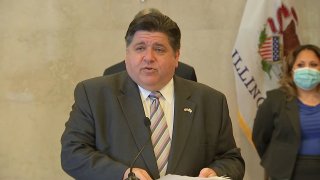
As lawmakers prepare to evaluate new rules filed by the Illinois Department of Public Health Friday, Gov. J.B. Pritzker says that the “modest” changes to the way the state’s mask mandate is enforced are more fair than enforcement measures currently on the books in the state.
Those rules, designed to give local health departments and law enforcement agencies “more leeway” in enforcing the state’s mask mandate and social gathering restrictions, will require approval of the Joint Committee on Administrative Rules.
Under provisions of the new rules, businesses, schools and child care facilities could face fines of up to $2,500 for refusing to comply with state mandates.
Even with that high dollar amount for violations, Pritzker says that the rules are actually much more fair and even-handed than other enforcement options that could have been used.
“The rule allows a modest level of enforcement similar to what many other states already have,” he said. “It prioritizes education and support for businesses over shaming and punishment. It stands in vast contrast to the arcane rules written long ago and without this pandemic in mind. These hard-and-fast rules can cripple businesses.”
Pritzker says the new rules will allow enforcement agencies and health departments to issue warnings rather than citations, and that the new rules are designed more for education purposes than punitive ones.
“Today I’m amplifying and providing enforcement mechanisms for something the experts are saying with near unanimity: mandating masks and capacity limits are two of the most important things we can do to stay healthy and safe during this pandemic,” he said.
News
Pritzker’s comments come as the state continues to face an increase in coronavirus cases, with nearly 1,400 more cases reported Sunday alone. The state’s 7-day rolling positivity rate currently sits at 4.1%, which is significantly lower than it was at the peak of the pandemic, but is much higher than it was at the metric’s low-point in June.
The governor says that the new rules on enforcement actions are designed not to punish violators, but to encourage them to adhere to rules that many businesses and individuals are following across the state.
“We’re doing this for the businesses that are following the rules while their competitors flout them,” he said. “We’re doing this for the people who have to work in the stores where their bosses won’t enforce public health rules, thereby putting their lives and health at risk.”



